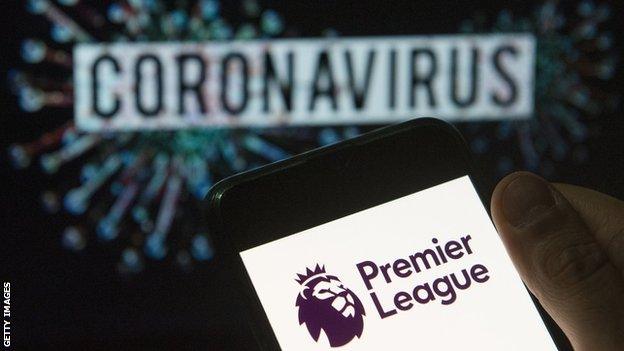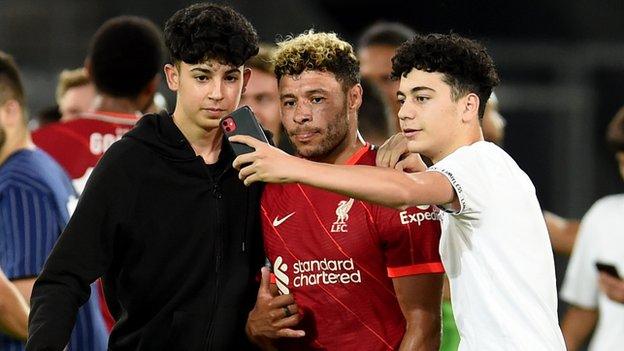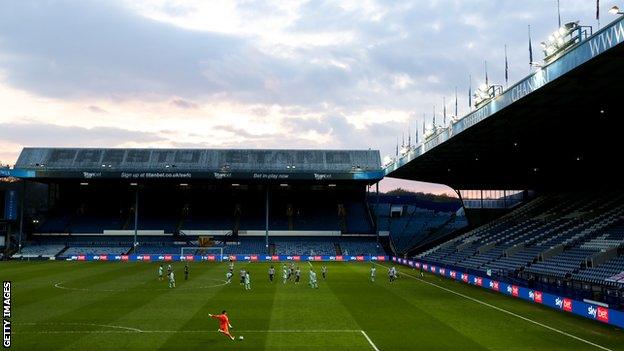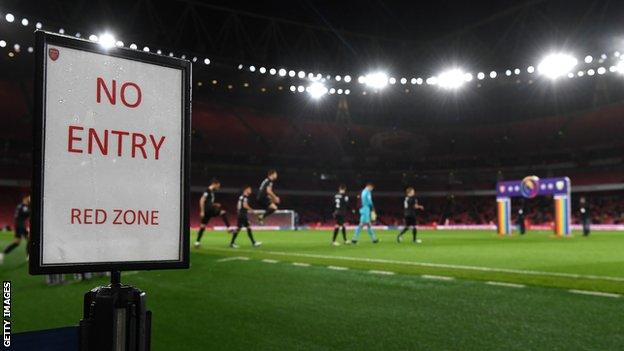Could a Covid-19 'pingdemic' ruin the start of the new football season?
- Published

While many restrictions are being lifted in football, the coronavirus pandemic will continue to impact the game in England
The new English football season gets under way this weekend with EFL Cup games taking place - but does a flurry of cancelled pre-season fixtures suggest another campaign will be disrupted by the coronavius pandemic?
Matches at Bournemouth and Sheffield Wednesday mark the first competitive domestic fixtures played with no coronavirus restrictions in place since March 2020.
Covid-19 infections remain high - although they are falling - and a nationwide record of self-isolation alerts from NHS contact tracing has led to worries of a 'pingdemic' spreading to football. Already a number of pre-season fixtures have been disrupted or cancelled as a result of outbreaks or close contact tracing issues in recent days.
Manchester United's friendly at Preston on Saturday is the latest to be called off because of positive cases, while Norwich have been similarly impacted, Arsenal scrapped their US pre-season tour and Newcastle lost three goalkeepers, external to self-isolation for one fixture.
So with the season about to start is there potential for chaos?
BBC Sport looks at the changes that have been made and why football could have a problem.
Players at greater risk

Alex Oxlade-Chamberlain was having photos with fans following Liverpool's pre-season match with Hertha Berlin in Austria on Thursday
Last season, the Professional Footballers' Association paid for players to be tested across the English Football League, at an estimated cost of £5m.
This term, there is no requirement to be tested.
It is acknowledged by all parties that players are at greater risk of both catching coronavirus or being 'pinged' as a close contact than they were last season - because footballers were in strict 'elite sort' bubbles and had far less interaction with the general public, both in their professional and personal lives.
Now with restrictions lifted for the general public, the leagues are trying to navigate their way through this. At present, this means there is no mandatory requirement for clubs to test players.
The EFL has issued guidance to all its clubs, for both training and on matchdays. Under that guidance, there are two sets of protocols, red and green. Most clubs are under the green protocols, which rely on daily screening to check if any players or staff are showing symptoms. The EFL believes this is better than simply doing nothing.
Red protocols would be triggered if there was a local coronavirus outbreak; if local or national restrictions were imposed by the government; or if EFL doctors carrying out spot checks at clubs discovered the regulations were not being adhered to.
Moves to red protocols would be made by the league after consultation with the clubs and would involve testing.

Hillsborough will welcome back fans for the start of the season
For Sunday's EFL Cup game at Hillsborough, BBC Sport understands Sheffield Wednesday's players will not be tested, unless someone reports symptoms.
However, Huddersfield's will be.
The Terriers believe lateral flow testing twice a week is the best way of being on top of any potential issue. Huddersfield, who are still receiving Premier League parachute payments, are funding these tests.
Evidently, if clubs are not testing, they cannot know for certain how many players, or who, have coronavirus at any given time.
If tests are then undertaken for whatever reason, matches are at risk of being called off at short notice.
On 28 July, Nottingham Forest were forced to pull out of that day's planned behind-closed-doors match with Aston Villa, and Norwich had to shelve plans to host Coventry after tests were returned positive.
Forest subsequently pulled out of a match with Burnley, scheduled to be played on 31 July. Chelsea had a pre-season game in Dublin called off hours before kick-off and Arsenal had to pull out of a tournament in the United States after they reported positive tests.
Premier League testing to continue

Pitches are designated red zones
The Premier League still intends to test twice a week and will publish the results. However, unlike last season, when players had PCR tests, this time they will have lateral flow tests, both to reduce costs and speed up the process.
As part of the Premier League's plan, the number of players and staff taking these tests will be increased to 100. Should any come back positive, a PCR test will then be arranged.
The Premier League is also going to continue operating red zones for players and senior staff.
For the first few weeks of the season at least, clubs will be asked to continue with the established virtual media conferences both before and after games.
Questions over the government's fan plan
At Hillsborough on Sunday, when a crowd of around 8,000 is expected for Wednesday's first game in front of fans since the pandemic began, there will be no social distancing measures in operation in the stands - apart from the media area - and supporters will not be required to wear masks.
No proof of vaccination status or previous negative tests will be required.
However, as a club who averaged over 24,000 in the last season completed with no restrictions, officials note the plan to make this compulsory for stadiums hosting crowds of 20,000 or higher - which is set to be trialled in pre-season games at Chelsea and Tottenham next month - and question how that can realistically be implemented on a busy matchday.
After two campaigns played in the shadow of the pandemic, clubs will be hoping this season could slowly return to some sort of normality being restored.